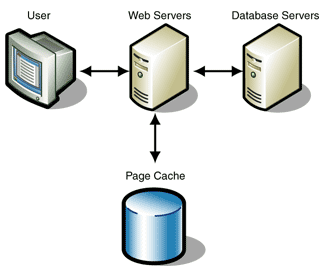Codeigniter page caching with query string
 |
| Fig: Basic Page Cache Flow |
CodeIgniter lets you cache your pages in order to achieve maximum performance. When a page is loaded for the first time, the cache file will be written to your application/cache folder.
To enable caching, put the following tag in any of your controller functions:
$this->output->cache(n);
Where n is the number of minutes you wish the page to remain cached between refreshes.
Warning: Because of the way CodeIgniter stores content for output, caching will only work if you are generating display for your controller with a view.
Problem:
It work only with segment based url.
What I'm seeing in my use cases and in the Output class code is that the caching is solely segment based. As such, http://www.example.com/segment/?q=foo andhttp://www.example.com/segment/?q=bar are treated as identical requests.
If you want your caching to work for query string as well,
You can just copy that code below and put it in application/core/MY_Output.php .
<?php /** * @author vee * @copyright http://www.okvee.net */ class MY_Output extends CI_Output { function __construct() { parent::__construct(); }// __construct /** * Update/serve a cached file * * @access public * @return void */ function _display_cache(&$CFG, &$URI) { $cache_path = ($CFG->item('cache_path') == '') ? APPPATH.'cache/' : $CFG->item('cache_path'); // Build the file path. The file name is an MD5 hash of the full URI $uri = $CFG->item('base_url'). $CFG->item('index_page'). $URI->uri_string; // buld query strings $querystrings = $_SERVER['QUERY_STRING']; if ( $querystrings != null ) {$querystrings = "?".$querystrings;} $uri = $uri.$querystrings; $filepath = $cache_path.md5($uri); if ( ! @file_exists($filepath)) { return FALSE; } if ( ! $fp = @fopen($filepath, FOPEN_READ)) { return FALSE; } flock($fp, LOCK_SH); $cache = ''; if (filesize($filepath) > 0) { $cache = fread($fp, filesize($filepath)); } flock($fp, LOCK_UN); fclose($fp); // Strip out the embedded timestamp if ( ! preg_match("/(\d+TS--->)/", $cache, $match)) { return FALSE; } // Has the file expired? If so we'll delete it. if (time() >= trim(str_replace('TS--->', '', $match['1']))) { if (is_really_writable($cache_path)) { @unlink($filepath); log_message('debug', "Cache file has expired. File deleted"); return FALSE; } } // Display the cache $this->_display(str_replace($match['0'], '', $cache)); log_message('debug', "Cache file is current. Sending it to browser."); return TRUE; }// _display_cache /** * Write a Cache File * * @access public * @return void */ function _write_cache($output) { $CI =& get_instance(); $path = $CI->config->item('cache_path'); $cache_path = ($path == '') ? APPPATH.'cache/' : $path; if ( ! is_dir($cache_path) OR ! is_really_writable($cache_path)) { log_message('error', "Unable to write cache file: ".$cache_path); return; } $uri = $CI->config->item('base_url'). $CI->config->item('index_page'). $CI->uri->uri_string(); // buld query strings $querystrings = $_SERVER['QUERY_STRING']; if ( $querystrings != null ) {$querystrings = "?".$querystrings;} $uri = $uri.$querystrings; $cache_path .= md5($uri); if ( ! $fp = @fopen($cache_path, FOPEN_WRITE_CREATE_DESTRUCTIVE)) { log_message('error', "Unable to write cache file: ".$cache_path); return; } $expire = time() + ($this->cache_expiration * 60); if (flock($fp, LOCK_EX)) { fwrite($fp, $expire.'TS--->'.$output); flock($fp, LOCK_UN); } else { log_message('error', "Unable to secure a file lock for file at: ".$cache_path); return; } fclose($fp); @chmod($cache_path, FILE_WRITE_MODE); log_message('debug', "Cache file written: ".$cache_path); }// _write_cache }
Ref: codeigniter cache with querystring, Web Page Caching

Pass the current time stamp
ReplyDeleteTheres a simpler way, just set cache_query_string to TRUE in your config file
ReplyDelete